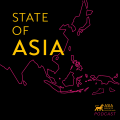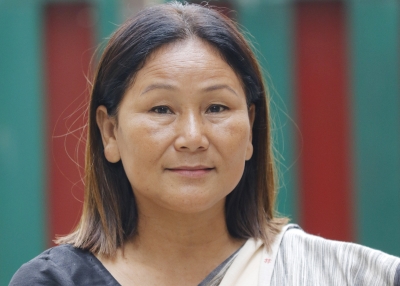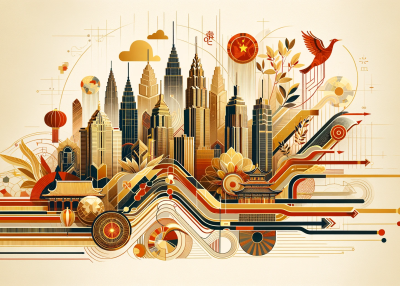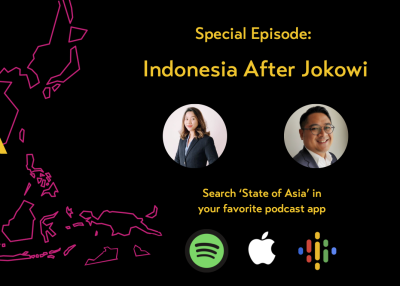State of Asia with Fuchsia Dunlop
On China's joyful and adventurous food culture
GUEST ON THIS EPISODE

Fuchsia Dunlop is a master cook, celebrated food writer, and accredited chef specializing in Chinese cuisine. She was the first Westerner to train as a chef at the Sichuan Institute of Higher Cuisine and has spent much of the last two decades exploring China and its food. She is the author of several award-winning books, and a contributor to the Financial Times, the New Yorker, and other publications. Her latest book is Invitation to a Banquet – The Story of Chinese Food, a fascinating 400-page read on the history and culture of Chinese cuisine, of which The New York Times wrote: 'This book will not only entertain and instruct you — it might make you go mad with longing.’
In this episode, Fuchsia talks about the joyfulness and adventurous approach many Chinese have towards food, about the 'most terrible misunderstanding' surrounding Chinese food in the West, and about how Chinese cuisine holds the secret to eating less meat, without feeling you're missing out.
Last year, Fuchsia talked about the flavors of Sichuan at an Asia Society Switzerland event in Zurich. Watch the video here.
STATE OF ASIA podcast

Season 5, Episode 5 – published November 14, 2023.
Host: Nico Luchsinger, Executive Director, Asia Society Switzerland
Editor/Producer: Remko Tanis, Programs and Editorial Manager, Asia Society Switzerland
Find previous and future episodes here, on Spotify, Apple Podcasts, Google Podcasts, or search for 'State of Asia' in any other podcast app. We're also on YouTube.
Transcript
00:00:00 Nico Luchsinger
From Asia Society Switzerland, this is State of Asia. In this podcast we are bringing you engaging conversations with leading minds and issues that shape Asia and affect us all. I'm your host, Nico Luchsinger.
00:00:11 Nico Luchsinger
Today we're doing something a little bit different. Food, of course, plays a major role in any culture around the world, and that's true for Asia as well.
Some might say even more so there than in other places. And so today, I want to talk about the state of Chinese cuisine in particular, and I'm delighted to welcome for this conversation none other than Fuchsia Dunlop.
00:00:28 Nico Luchsinger
Fuchsia, of course, is a cook and food writer specializing in Chinese cuisine. She was the first Westerner to train as a chef at the Sichuan Institute of Higher cuisine and has spent much of the last two decades exploring China and its food. She's the author of several award-winning books and a contributor to the Financial Times, The New Yorker, and other publications. Her latest book, just out a few weeks ago, is Invitation to a Banquet.
00:00:51 Nico Luchsinger
A really fascinating 400 page-read on the history and culture of Chinese food. Fuchsia, welcome to the State of Asia podcast.
One very dominant theme in conversations about China is always change, because arguably no other country has changed as quickly over the last decade as China. And so, a question I love asking people who have lived in China for longer and have observed the country closely is: what actually hasn't changed overall that time? And one answer that always, always comes up is the food.
00:01:20 Nico Luchsinger
But I actually assume that some things have changed, so let's maybe start here. Over the last 20 years, since, you know, you've been observing Chinese food and cuisine, what are some of the things that you have seen change.
00:01:32 Fuchsia Dunlop
Well, so many things. It's hard to know where to begin. The whole food scene has got very commercial and very competitive with the sort of relaunch of a market economy and the standards of restaurant service and presentation have been transformed.
00:01:52 Fuchsia Dunlop
You know, when I was first there many restaurants had that sort of rather stale feel with, you know, very old-fashioned decor and rather notoriously poor service and so on. And that's all changed very much. There's also been a great period of cultural exchange among Chinese regions. I think starting in the 90s with Sichuan restaurants, opening branches all over the country. And now, for example, in Chengdu.
00:02:20 Fuchsia Dunlop
So, when I was a student there most in this is in the 1990s, most of the restaurants served something that was recognizably Sichuanese food, and now you can go out for Thai food, Japanese pizza, so it's become much more diverse.
00:02:30 Fuchsia Dunlop
And there are many new ingredients that have come from abroad. Very conspicuously, for one example, okra, which was not in evidence anywhere and is now on every trendy restaurant menu cooked in Chinese ways. But then there have also been lots of really negative changes, like very rapid urbanization has claimed as its victims sort of the neighborhood markets, which were one of the highlights of sort of street life when I was a student.
00:03:00 Fuchsia Dunlop
There are more supermarkets and fewer fresh markets and I think also there's just a decline in domestic cooking skills. So, the older generation in China, the sort of parents and grandparents when I was a student there, there were many of them, very accomplished cooks and they could also make their own pickles. They could cure their own winter sausages and meats, and they cooked from scratch practically every day.
00:03:21 Fuchsia Dunlop
These days, there's such pressure on young people to study that many of them are not really learning how to cook and of course now there's this in one sense, glorious availability of take-out food. I mean, you can get anything delivered to your door very quickly, but it's just that I think younger people are conspicuously not learning from their parents these kitchen skills. And I think that's a real shame because that was one of the things that most impressed me when I lived in Sichuan.
00:03:49 Nico Luchsinger
Are there also specifically Chinese food trends that you're observing a certain style of cooking, or a certain dish that is kind of gaining dramatically in popularity and then maybe also disappearing again, have you observed things like this?
00:04:01 Fuchsia Dunlop
Oh, constantly. I mean, China is a really food-obsessed country and culture. And so, there are always new trends. One thing that was very noticeable when I was on my last trip earlier this year was that people were talking about Fujian and going to these towns like Zhangzhou on holiday and then also talking about Fujianese food. And that's something that wasn't really on the tip of anyone's tongue 20 years ago.
00:04:26 Fuchsia Dunlop
And also, a trend slightly negative change for what they call, which means dishes that are pre-prepared in a central kitchen and then simply reheated or finished in restaurants and that was something that everyone was talking about earlier this year. And again, a huge change from the old days, 20 or 30 years ago when every restaurant was cooking everything from scratch. And also, one thing that was totally surprising to me and rather hilarious was that if you stay in a hotel these days, you can get your takeaways delivered to your room by robot, which is something that, you know, I haven't seen in Europe so far.
00:05:04 Nico Luchsinger
Obviously, Chinese cuisine is somewhat of a misnomer. There is no such thing as Chinese cuisine. It's way too large and diverse of a country to have like 1 style of cuisine. And so, there are different ways that we can classify Chinese cuisine by region, by province, such Chinese cuisine versus Cantonese cuisine versus Hunanese. Then then of course you have the north-south distinction, the rice versus wheat. Is there a classification or a structure that you would apply sort of to the entirety of Chinese cuisine that you find particularly helpful?
00:05:34 Fuchsia Dunlop
Yeah. Well, as you say, there are lots of very contentious different systems for classification. There is no hard and fast way of doing that of course, because cuisines don't have boundaries and they don't have national boundaries either because, for example, Yunnan province, the culinary styles in the South and West of Yunnan just melt naturally into the culinary traditions of Myanmar, Laos, Vietnam, with lots of cross-border similarity.
00:06:00 Fuchsia Dunlop
And the same in northern China with Central Asia, but within China, I think that you could just drive yourself crazy arguing about where to draw the distinctions and which places merit individual consideration only. I find the four great cuisines to be really helpful as a guide.
00:06:20 Fuchsia Dunlop
Because that draws your attention to firstly, the major difference that you just mentioned between the wheat eating north and the rice eating south and there are other sort of broad things that you can say about North and South like in the north, they tend to favor sort of bold garlic and vinegary seasonings. They have not only wheat as a staple, all kinds of breads and dumplings and noodles, but more cold weather crops. And in the South it's rice based.
00:06:50 Fuchsia Dunlop
And ohh sorry. And in the north also they eat a lot of mutton and lamb. And in the South it's pork and dark poultry. Very important and lots of fish as well as rice, great biodiversity. Many, many fresh vegetables and then the east and West is another interesting sort of cultural distinction, because that would sort of showcase the difference between the very hearty, boldly seasoned, spicy cooking of Sichuan, which is flag bearer of Western Chinese cooking.
00:07:29 Fuchsia Dunlop
And the very delicate flavors, beautiful watery food. So not just fish and seafood, but lots of water vegetables like water chestnuts and also freshwater crabs and water bamboo, all these really interesting plant and animal foods, but also the Jiangnan region. So that's the region sort of inland from Shanghai including Shanghai was the historical headquarters of Chinese gastronomical writing. So many of the sort of famous literary poems and the cookbooks many of them came from this region.
00:07:52 Fuchsia Dunlop
So, I think if you think of these four great regions, the sort of dumplings and noodles of the north, the spice of Sichuan, the delicate cuisine of the east and then for example, Cantonese with its seafood and wonderful fresh vegetables, so on and delicate like flavors in the South. Then it expresses something of the radical diversity of Chinese cuisine and the fact that the differences in different regions of China are as great as the differences between, you know, Northern European countries from southern European countries, so for me that's a very useful guide and as long as you remember that it's a simplification and just as saying, Chinese cuisine at all is a simplification.
00:08:33 Nico Luchsinger
I was recently at a dinner here in Switzerland and part of the dinner was a larger Chinese delegation and the restaurant undoubtedly wanting to show off to the local cuisine, started with a creamy soup. I think it was cauliflower at the beginning and then a famous Swiss dish involving potatoes, meat, mushroom, and cream. And then for dessert there’s like a huge slice of apple strudel with vanilla sauce and as I was like eating my way through this very, very heavy meal, I sort of thinking of how you often talk about like harmony and balance in Chinese cooking which very clearly was lacking in in this meal it was good, but it was just so heavy. I was wondering whether you could talk a little how Chinese cuisine achieves this balance and maybe why in your view, Chinese cuisine has been better at this than maybe some other cuisine?
00:09:18 Fuchsia Dunlop
Yeah. Well, I mean, of course the big irony is that so many people in, you know, America and Britain and I don't know whether it's in Switzerland, too, but when people think of Chinese food, they think of quite inexpensive take-away food, and they don't think it's healthy. There's a stereotype that Chinese food, it's all sort of sweet and sour and deep-fried food and fried rice, and it's not very healthy. And this is the most terrible misunderstanding about what Chinese food is all about.
00:09:45 Fuchsia Dunlop
Because, of course, that style of Western Chinese take-away food, it's very tasty, but it's not really representative of what most Chinese people still eat at home all over the country. And as you say, the idea of balance for the Chinese food and medicine have been thoroughly intertwined, really since the beginnings of Chinese culture and civilization.
00:10:07 Fuchsia Dunlop
The earliest Chinese written recipes were actually medical prescriptions for dishes that with tonic properties and food has been seen as the foundation of good health for more than 2000 years. As you and anyone who has Chinese friends will know, Chinese people typically talk about food and health just constantly and almost unconsciously. You know, they change what they eat according to how they're feeling, or they're season or the weather.
00:10:31 Fuchsia Dunlop
Your diet is how you respond to how you are and it's how you create and maintain good health. And so, this idea of balance is that so it's partly about health. So, if you have a very heavy, meaty dish, you'll always have, you know, a light vegetable dish as well. And typically, a meal will be served with a fairly plain and understated staple food, whether it's just steamed rice in the South or steamed buns in the north.
00:11:00 Fuchsia Dunlop
The strong dishes tend to be balanced, and the meaty dishes with a lot of vegetables. Like in England, we often you if you go out to a restaurant or you have a special meal, the vegetable dishes sometimes seem like an afterthought. They're just small side dishes and they're not, it's not that people take particularly trouble with flavoring them or making them appealing. They're just something on the side.
00:11:20 Fuchsia Dunlop
Whereas in China, vegetable cookery is also paid great attention to taste and pleasure and so on. But also, there's an aesthetic component because a well-planned Chinese menu should be balanced in all senses. So, you want a good balance, for example of colors.
00:11:38 Fuchsia Dunlop
So, if you have one dark red, braised pork colored with a lot of soy sauce, then you probably want something that's a nice vibrant green or a different color so that the table looks lively. If you're cooking a very pale ingredient like slices of fish, you might brighten it up by adding a few slices of red and green pepper for color.
00:12:00 Fuchsia Dunlop
There's also a balance between different cooking methods, so if you have something that's dry and deep fried, then you'll want something that's soupy, you know, steamed dishes will balance stir-fried dishes. Also, the way food is cut. So, if you have something that is cut into cubes, maybe the next dish will be cut into slivers, so the idea is that you have this very appealing and a pleasing harmony and variety, so you don't want to repeat the same ingredient in more than one dishes. And the idea is that variety is what makes food palatable as well as healthy.
00:12:37 Fuchsia Dunlop
It's one of the great pleasures of Chinese cuisine, and it's one of the reasons why one of the terrible and hilarious Chinese stereotypes about Western food is that it's yidian dan and danyo, which means very simple and monotonous. And I can't tell you how many Chinese people have said that about Western food, which they, you know, often talk about as if it was 1 great, one cuisine, like we talk about Chinese.
00:13:00 Nico Luchsinger
Well, it's good to know that there's stereotypes on both sides. The kind of balance that you talk about is also somewhat easier to achieve if you have a variety of dishes that you can prepare and maybe you're cooking for a larger group. It's actually been my experience even when invited at someone's home for Chinese food, this is going to be like an impossibly large amount of dishes, and my assumption is that the person has spent the better part of their day preparing all of this. So you talked about people cooking less at home because there's also more pressures just of studying or working. Translate this and assume you're a Chinese family. You have jobs, you have kids, you kind of come home at like 7:00 PM.
00:13:39 Nico Luchsinger
And then you need to have dinner ready in 30 minutes. Like, how are you doing different slices and cooking methods and dishes in like this half hour, right? So there has to be a different approach to that challenge for sort of like weekday family cooking.
00:13:51 Fuchsia Dunlop
Of course, it's reduced compared with the banquet or a special meal for friends.
00:13:56 Fuchsia Dunlop
But actually, Chinese cooking can be quite quick and handy if you have a few basic techniques. So, for example, you could just stir-fry some beaten egg with a couple of tomatoes to make one dish of beautiful colors and stir-fry another green vegetable and have the rice cooking in the rice cooker.
00:14:16 Fuchsia Dunlop
And that's a basic meal which will be tasty and colorful and varied and nutritionally balanced, which really doesn't take any time at all. I mean, so I think there are ways of cooking and also, you know, in traditional Chinese cooking there are short cuts.
00:14:29 Fuchsia Dunlop
So, you might buy some tasty relishes made from Sichuan, for example, pickled vegetables or tofu that's been tossed in chili oil and spices so you can pick them up at your market with your fresh vegetables or roast meats that people often buy in, like Cantonese, Cha, Chao and roast up.
00:14:50 Fuchsia Dunlop
People don't make these things at home so you can buy some things in and serve them with home cooked vegetables and steamed rice that you steamed at home. So, I think Chinese cooking doesn't have to be so complicated.
00:15:01 Fuchsia Dunlop
And also, just something that I often cook at home. Just a simple working lunch. So, a bowl full of noodles. So, if you have some stock in the freezer and then you just boil some dried noodles or noodles from the freezer, have a little bit of a leftover meat stew. You put that on top, you slice some spring onions for color.
00:15:22 Fuchsia Dunlop
Maybe you have some Pickles on the side, a bit of radish. And already you've got a beautiful variety of colors, some fresh things, some, you know, some things. So, it doesn't have to be complicated. It's more a sort of approach that you can tailor to your circumstances and how much time you have available.
00:15:38 Nico Luchsinger
I just want to say that we're recording this around like 5:00 PM Switzerland time and I feel like I have to go now and make one of these for dinner. I love egg and tomatoes and rice sounds fantastic.
00:15:53 Nico Luchsinger
One aspect of Chinese cuisine that you also discuss in the book is the idea of meat as a condiment, of using meat products not as like a central component of a dish, but more as a tool for flavoring, for adding depth, and maybe lusciousness to a dish. Talk a little bit about how that, how that exactly works. It seems like a very clever idea.
00:16:07 Fuchsia Dunlop
Yeah. Well, I mean, it's just that until quite recently, many Chinese people ate mainly vegetables because that's, you know, all they could afford to do. And so, in ancient China, one name for the rich was meat eaters. They were the people who ate meat.
00:16:22 Fuchsia Dunlop
And other people were living on grains and vegetables. Until very recent memory people couldn't afford to eat much meat. And so Chinese cuisine, just structurally and stylistically, is particularly suited to making meat go further, mainly because for about 2000 years people in China have been in the habit of cutting food into small pieces and eating it with chopsticks. And what, of course that does is it means that you can take ingredients, you can cut them small, and you can combine them to make a variety of dishes.
00:16:55 Fuchsia Dunlop
Lin Yutang, that great interpreter of Chinese culture for Western audiences, said something like that, you know, Chinese cuisine was fundamentally about the art of mixture in that context. A piece of meat that, you know, a steak that would feed one American or Brit, in Chinese cuisine you quite naturally would cut it into fine slivers.
00:17:16 Fuchsia Dunlop
And if you do that, then you can stir-fry it with something like celery or Chinese chives, or one of any number of vegetables cut harmoniously into the same sorts of slices or slivers, and you make a very appealing dish which is tasty, but which serves more people. You know, it can appear on the table with other vegetable or meat dishes and serve a whole family. So, it's partly about the way the food is prepared. Cut into small pieces.
00:17:44 Fuchsia Dunlop
Also, about the idea, which means that you should balance meat and vegetables. So, often in a single dish, and also just traditional Chinese cooking technique is a lot about creating umami flavors by adding a little bit of something tasty to another ingredient that is a little blander. So, for example you might use dried shrimps when you're cooking winter melon, which is a very delicately flavored vegetable, and by using dried shrimps you give it the kind of robust, satisfying rounded flavor that you get in a more meaty dish.
00:18:21 Fuchsia Dunlop
And Chinese people do that with all kinds of, you know, using a little bit of lard, a little bit of cured pork or sausage or slivers of actual meat or stock to cook vegetable dishes for there's a way of saying which is, which means vegetable dishes, cooked meatly. So, you get some of the pleasure of eating meat without actually using a lot of meat.
00:18:48 Fuchsia Dunlop
And that's one of the things that I think makes Chinese food as a sort of style of eating incredibly relevant these days, because we all have to find ways of eating less meat, or we are going to destroy the planet.
00:18:53 Fuchsia Dunlop
And the great thing about Chinese cuisine is that, I mean, I find, and I know a lot of readers of my cookbooks have told me they found if you cook in a Chinese way, you quite naturally can find yourself eating less meat without feeling that you're sacrificing something. That Chinese is a very, very good at creating flavor with vegetables.
00:19:13 Fuchsia Dunlop
And of course, one should say that the irony of this whole conversation is that these days the Chinese, now they can afford it, and with this kind of excitement, after a period of not having enough meat, are going crazy for eating meat and eating more than they ever have done.
00:19:29 Fuchsia Dunlop
And this is, as I'm sure you know, the Chinese growing demand for meat, which is one of the big environmental stresses that we face, and of course, from a Chinese point of view, they're just catching up with the gluttony of other countries. But collectively, I feel that the rest of us and the Chinese themselves could look more to the traditional Chinese diet as a model of more sustainable eating and also more healthy eating, because of course there are health benefits to eating less meat.
00:20:00 Fuchsia Dunlop
I mean, I find it very worrying because it is this extremely food-obsessed culture where people have placed a great premium on not just healthy eating, but on eating for pleasure and of combining health and pleasure. Even with Buddhist vegetarian cooking, which is supposed to be about restraint, you can have tremendous banquets of entirely plant-based food, often resembling meat and fish.
00:20:28 Fuchsia Dunlop
So, I just think and for me it's just this joyfulness about food and brilliant culinary technique which you can actually couple with eating in a more restrained way without losing the fun and the joy of it.
00:20:41 Nico Luchsinger
One of the truly most mind-blowing facts that I've learned from you writing is about fermenting beans, which is something that is incredibly central to Chinese cuisine and East Asian cuisine in general, but it's also virtually unknown in the West.
00:20:52 Nico Luchsinger
And that's remarkable because historically, of course, Europeans had beans and they knew how to ferment things. They fermented a great many type of things from beer to cheese to bread. Yet they did not ferment beans. So why is bean fermentation so essential in Chinese cuisine? And do you have any theories on why the Europeans just never thought of doing that?
00:21:10 Fuchsia Dunlop
Well, as you say, it goes back to very ancient times. So, in the Han dynasty, again sort of around 2000 years ago, the fermented black beans that you can still find in any Chinese supermarket were being made and traded in China, so they have a very long history. The way that you ferment beans is a bit different from the way you ferment other ingredients in the West because of the use of coji as a method or tube, as it's known in Chinese.
00:21:42 Fuchsia Dunlop
So, it's the use of these molds which combine enzymes and yeasts and mold and fungi to convert starches and so on into this wonderful range of flavors, and so particularly the soybean which was first domesticated in China perhaps about 3000 years ago, and which is a desperately unappealing ingredient in its raw state, you know it, it takes a lot of cooking just to make it edible, and it's still a bit smelly. And actually, in some ways anti digestible because some chemicals in it. So, it wasn't a very appealing ingredient, but when the Chinese discovered how to ferment it, they unlocked this extraordinary source of plant protein and all these delicious flavors which again help to make vegetarian food more palatable because you have that fullness of flavor that I think a lot of people enjoy getting from meat. They became very important in Chinese food very early on and then at some point it's not clear exactly when they also discovered how to grind the beans.
00:22:43 Fuchsia Dunlop
And to you know, so-called milk and coagulate it to make tofu and that was becoming a very popular and well-known product, you know, hundreds about 1000 years ago. And so that then became a source of protein that you could then cook like meat. So, the whole question about why the Chinese did and Europeans didn't, I mean the soybean was sort of native to China and not to the West.
00:23:09 Fuchsia Dunlop
And in fact, it didn't come to the West until very late and was initially just used for sort of, I think animal food and oil as it still is mostly in in the West. The key thing here may well be dairy products because in the West dairy foods were very important, pastureland rearing cattle and eating dairy foods and of course they provide a lot of the same nutrition
00:23:32 Fuchsia Dunlop
and protein as soy milk does and soybeans, whereas in China there again there are different theories as why the Chinese didn't take to dairy products. One is that they were keen to draw a cultural distinction between the Chinese and the Nomads, so-called Barbarians who lived beyond the Great Wall and used to sometimes come and invaded, who had a very different lifestyle, so they were pastoralists and they relied on meat and dairy food.
00:24:01 Fuchsia Dunlop
So that's the sort of cultural argument, but also of course, the soybean ended up offering much of the same nutrition. So, you know, that may be another explanation that they just had this alternative source of protein and flavor, and it had huge implications for the Chinese diet and making a more vegetarian inclined diet very palatable.
00:24:22 Fuchsia Dunlop
And also, for the Chinese landscape, because in most of China you don't have pasture lands, but it is really interesting that fermented beans have just not been explored in the West at all until kind of yesterday.
00:24:38 Nico Luchsinger
You also write a lot about how we as in the West, Europeans, deeply misunderstand Chinese food. Do you see parallels between how we misunderstand the cuisine and maybe the culture and the country in general?
00:24:50 Fuchsia Dunlop
Well, I think they're very connected. For example, Chinese food in the West was kind of created by Cantonese immigrants to America from the 19th century onwards. A lot of them went from the Cantonese, many of them quite poor farmers. They went in the gold rush, and they worked on the railroads, and later they faced not only racial discrimination, but actually legal, officially sanctioned discrimination in the form of the Chinese Exclusion Act, which made it almost impossible for Chinese people to immigrate anymore.
00:25:21 Fuchsia Dunlop
And they were sort of forced into the catering trade and the laundry trade, for lack of other opportunities. And there's always been this sort of negativity about, you know, from that time about Chinese and about Chinese food. And I think so it's always been very connected with racial prejudice and with ignorance about what these people really do eat and part of that with Chinese food. So, there were economic reasons. You know that situation from which Chinese prejudice grew in 19th-century America. And also, there are language challenges because of course Chinese is a very different language.
00:25:57 Fuchsia Dunlop
And it's actually when it comes to food, it's very difficult to express some concepts and terms in English because we don't have equivalent vocabulary. There have been all these stereotypes about Chinese food which have grown out of misunderstanding, like the idea that it's unhealthy because people are judging it by a particular style of inexpensive take-out food.
00:26:18 Fuchsia Dunlop
The idea that the Chinese eat everything, which is certainly true to an extent because the Chinese are joyful and adventurous eaters, and they eat many different ingredients that other cultures don't.
00:26:29 Fuchsia Dunlop
But the fact that this has been seen so negatively I think is really just about prejudice. So yes, you can say that the two are connected and I think that was really shown during the COVID pandemic when these sort of fears about the origins of virus in China, did it come from some wild animal stall at a market, led to this huge prejudice against Chinese people. You know, in America, in Britain, which was out of all proportion to the actual matter at hand and it just sort of revealed very uncomfortably, some kind of latent prejudice which was there, which was actually connected with the food.
00:27:12 Fuchsia Dunlop
I think one of the problems now with all these geopolitical tensions is that there is less travel, fewer Westerners are going to China living there and working there, and that's not encouraging understanding and it's like the more differences we have, the more crucially important it is that we try to understand each other.
00:27:30 Fuchsia Dunlop
Food is a, it's many peoples entry into understanding China. It's many Westerners first encounter with China and it's a really good way in because it reveals so much about China and Chinese culture. The reason that people have all these negative stereotypes about Chinese food is because they don't know what it's really like. They don't really have an experience of it.
00:27:51 Fuchsia Dunlop
And you could argue the same about China. You know, people are making judgments on very limited information.
00:27:56 Nico Luchsinger
You've been writing about food for a really long time, and it always seemed to me that writing about food, whether it's about the cooking part or the eating out part, is incredibly, incredibly hard to do well without sort of drifting into cliches. You do it wonderfully and you know, one great hallmark is that whenever I read something that you've written about Chinese food, it, it just makes me hungry. But I wanted to ask, as someone who's been doing this for so long, what for you makes a good food writer?
00:28:24 Fuchsia Dunlop
I think that it's not, I mean it's not in a sense different from any other kind of writing in that you want to write with real observation and integrity, and you want to really notice things when you eat something. To really consider it and to think about the context. And I think also to be very honest, so not to make things up, try and do it with some integrity and with thought.
00:28:50 Fuchsia Dunlop
And the other thing is that I mean I feel that you know sometimes when I go to China often in fact Chinese people say oh, why have you come to China? And I say I've come to China to eat, and they think I'm joking, but I'm not really joking because I feel that I really tried to educate myself through eating and to understand food as a sensory experience as well as a cultural and an intellectual experience. And it's all of those things really.
00:29:16 Nico Luchsinger
Excellent. Fuchsia Dunlop. Thank you so much for having been on State of Asia.
00:29:19 Fuchsia Dunlop
Thank you.
More Episodes
-
podcast
-
podcast









